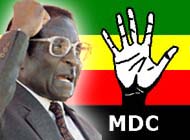Zimbabwe still blocking relief efforts despite official green light
 Harare - Aid agencies trying to distribute food to hungry Zimbabweans are still being stopped by state officials, despite the lifting of the Zimbabwe government's ban on aid agency operations, their representative body said Tuesday.
Harare - Aid agencies trying to distribute food to hungry Zimbabweans are still being stopped by state officials, despite the lifting of the Zimbabwe government's ban on aid agency operations, their representative body said Tuesday.
"We have a situation where military officials want letters authorizing us to resume operations," said Fambai Ngirande, spokesman for the National Association of Non-Governmental Organizations.
"It appears that the message of the lifting of the ban has not been communicated to all state structures, particularly the security structures."
Around 2 million people are in need of food aid to avert starvation in Zimbabwe - a number that is predicted to rise to to 5 million by January.
"If it (the situation) progresses much further, it will become catastrophic," said Matthew Cochrane, a spokesman for the International Federation of Red Cross and Red Crescent Societies, who visited the south-central Masvingo area this week.
President Robert Mugabe's regime ordered humanitarian agencies to halt their operations on June 4, claiming the agencies were "dabbling in politics" and giving people food to persuade them to vote for the Movement for Democratic Change (MDC) of Morgan Tsvangirai.
Aid agency officials, human rights groups and churches say that, on the contrary, there is incontrovertible evidence that the government uses food aid as "a political weapon," denying food to people suspected of supporting Tsvangirai.
State media on Tuesday published a long list of requirements that aid agencies have to fulfil in order to be allowed to operate.
These include details on the source and use of donations, programme objectives and even profiles of their staff.
"It is imperative that non-governmental organizations know that they are operating in the country to complement government and not to set parallel structures," Social Welfare Ministry Permanent Secretary Lancaster Museka said. "The police will not hesitate to enforce the law."
Ngirande said they had been told by welfare ministry officials at a meeting on Monday that they would have to supply all the information by the end of the month, or be "deregistered."
"Clearly the government is working as hard as it can to throw a spanner in the works," he said. The ban in June was illegal, he said, "and now they are using extra-legal requirements."
Zimbabwe has been in crisis since March when Mugabe and his Zanu- PF suffered an unprecedented defeat to the MDC, though Tsvangirai's majority in the presidential elections was short of the absolute majority needed to win.
Zanu-PF blamed aid agencies' food distribution as one of the reasons for their defeat.
The Red Cross is one of the few agencies to have unfettered access in Zimbabwe, where it distributes food aid, seed and fertilizer.
In rural areas people commonly go for three or four days without food, according to Cochrane.
When they do eat, their meals consist usually of vegetables.
The situation is most critical for HIV/AIDS patients on life- prolonging antiretroviral (ARVs) drugs, many of whom are defaulting on their treatment because, without food, the drugs are extremely toxic.
Zimbabweans are hoping that a negotiated political settlement will end their misery by unlocking large amounts of Western aid.
South Africa is mediating in talks on the formation of a power- sharing government comprising both Zanu-PF and the MDC, but the talks have been deadlocked for weeks over how Mugabe and Tsvangirai would share power if Tsvangirai becomes prime minister.
Mugabe claims he should lead Zimbabwe after winning the presidential election run-off in a one-man contest that was condemned throughout the world. (dpa)
